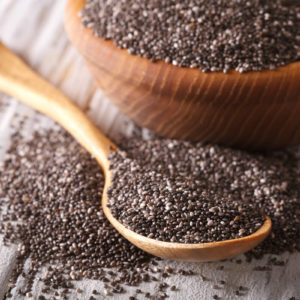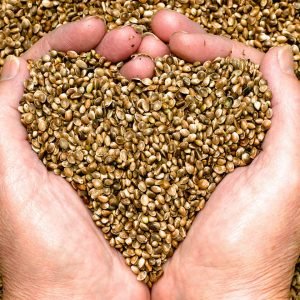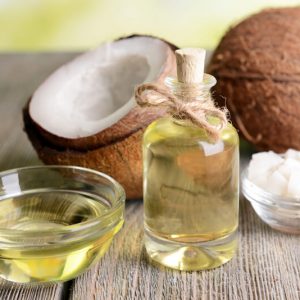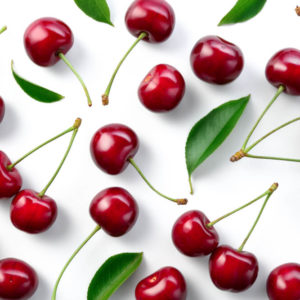
Do superfoods have magic powers, or are they just items everyone should eat more of?
Take the sunflower seed, for example.
Most people know this snack as salty little morsels favored by baseball players and Fox Mulder.
Others stock bird feeders with it, but not pantries.
Are we missing out?
What Are Sunflower Seeds?
The sunflower is one of the few crops that originated in North America.
Sunflower seeds are, of course, the fruiting bodies of sunflowers.
The seeds reside in the large, dark, center blossom of the sunflower, which is simply called the head. These seeds appear in a distinctive, repeating geometric pattern called the Fibonacci Sequence. This pattern is surprisingly common throughout nature (1).
Indigenous Peoples of North America domesticated it, then carried in eastward and southward. Today, it has many uses. For example, sunflowers account for 14% of the world’s seed oil production (2).
Parts of the crop that aren’t turned into oil can be used to feed animals, including cattle, sheep, goats, pigs, chickens and more. It’s a successful alternative to soybeans, with a fiber content ranging from 28% to 42%.
Health Benefits of Sunflower Seeds
Beyond practicality, sunflower seeds come with a myriad of health benefits.
1. Goldmine of Nutrients
According to nutritional therapist Maria Griffiths, there’s a simple reason why seeds of all kinds are a nutritional goldmine. “Seeds provide the ‘board and lodging’ for the next generation of plants, so it’s not surprising they’re such a complete food … They contain all the ingredients required for germination so that the plant can come into full fruition” (3).
Griffiths says seeds are dense enough in nutrients that you only need a tablespoon — or maybe two — each day.
Here’s a list of the nutrients that sunflower seeds contain and why they’re essential for human health:
- Magnesium: Regulates blood sugar levels and maintains the nerves and muscles.
- B complex vitamins: Essential for keeping the immune system functioning properly.
- Calcium: Builds and strengthens bones, aids muscle function and allows blood to clot.
- Phosphorus: Helps form healthy teeth and bones and aids in repairing tissues and cells.
- Copper and iron: Together, these elements keep nerves, bones and blood vessels healthy.
- Manganese: Helps the body metabolize carbohydrates and digest amino acids and proteins.
- Carotene: The body converts carotene into vitamin A, which is good for eye and skin health.
- Protein: Builds and repairs muscles and tissues, manufactures hormones and other chemicals.
- Mono/polyunsaturated fatty acids: Good fats that regulate cholesterol levels and maintain cellular function.
- Vitamin E: Essential for immune system functionality, helps with inflammation and protects cells from free radicals.
- Zinc: Helps the body recover from wounds and injuries and aids the immune system in fighting off bacterial intruders.
Here is the nutrient profile for just 1 cup (46 grams) of sunflower seeds:
| PRINCIPAL | NUTRIENT VALUE | PERCENTAGE OF RDA |
| Calories | 269 kcal | 13% |
| Carbohydrates | 9.2 g | 3% |
| Fat | 23.7 g | 36% |
| Protein | 9.6 g | 19% |
| Cholesterol | 0 mg | 0% |
| Dietary Fiber | 4.0 g | 16% |
| VITAMINS | ||
| Vitamin C | 0.6 mg | 1% |
| Vitamin E | 15.3 mg | 76% |
| Thiamin | 0.7 mg | 45% |
| Riboflavin | 0.2 mg | 10% |
| Niacin | 3.8 mg | 19% |
| Vitamin B6 | 0.6 mg | 31% |
| Folate | 104 mcg | 26% |
| Pantothenic Acid | 0.5 mg | 5% |
| Choline | 25.3 mg | |
| Betaine | 16.3 mg | |
| MINERALS | ||
| Calcium | 35.9 mg | 4% |
| Iron | 2.4 mg | 13% |
| Magnesium | 150 mg | 37% |
| Phosphorus | 304 mg | 30% |
| Potassium | 297 mg | 8% |
| Sodium | 4.1 mg | 0% |
| Zinc | 2.3 mg | 15% |
| Copper | 0.8 mg | 41% |
| Manganese | 0.9 mg | 45% |
| Selenium | 24.4 mcg | 35% |
Some of these nutrients appear in trace amounts, such as manganese and copper. However, this is an impressively long list — especially considering how small sunflower seeds are. They pack a nutritional punch!
2. May Fight Cardiovascular Disease
The good fats — monounsaturated and polyunsaturated — found in sunflower seeds keep blood cholesterol levels under control in the human body (4✓)✓ Trusted ResourcePubMed CentralHighly respected database from the National Institutes of HealthRead source. High cholesterol narrows or clogs the blood vessels, which in turn dramatically increases one’s risk of stroke and heart disease (5).
Because of this, published scientific papers claim there is “substantial evidence that increased consumption of seeds, including whole grains, nuts, legumes, cocoa products and coffee, is associated with lower risk of CVD [cardiovascular disease] and T2DM [type 2 diabetes mellitus] or a significant reduction in risk factors” (6✓)✓ Trusted ResourcePubMed CentralHighly respected database from the National Institutes of HealthRead source.
Type 2 diabetes mellitus is better known as adult-onset diabetes. For individuals who already suffer from this condition, adding sunflower seeds as a regular part of one’s diet may help regulate blood glucose levels between meals. According to research, this is thanks to the chlorogenic acid found in sunflower seeds, which inhibits the breakdown of glycogen in the liver (7).
3. May Help Prevent Diabetes
What about preventing diabetes in the first place? Sunflower seeds are a high-fiber food, a carbohydrate known to slow the rate at which sugar is absorbed into the bloodstream (8✓)✓ Trusted ResourcePubMed CentralHighly respected database from the National Institutes of HealthRead source. Due to the reduction in blood sugar crashes and spikes, there is reason to believe eating sunflower seeds may lower one’s chances of developing insulin resistance and diabetes.
The magnesium found in sunflower seeds is another component that research associates with a lower risk of diabetes. Throughout 13 studies and more than 500,000 participants, scientists detected an inverse link between magnesium intake and risk of type 2 diabetes. This link is not affected by geographic location, sex or family history of the disease (9✓)✓ Trusted ResourcePubMed CentralHighly respected database from the National Institutes of HealthRead source.
4. Help Improve Immune Response
In any event, insulin resistance and consistently high blood sugar can cause problems with the body’s immune response and lead to inflammation, unnecessary weight gain and even various cancers (10). The effects of sunflower seeds on the immune response may be of special interest to many individuals who struggle to maintain their wellness, like those who work in close proximity with the public, and want every advantage they can find.
5. Reduce Chronic Inflammation
Sunflowers are an excellent source of vitamin E. This vitamin helps the human body reduce chronic inflammation, which scientists believe plays a role in the development of a variety of severe conditions, including heart disease, diabetes, cancer, autoimmune diseases and clinical depression (11✓)✓ Trusted ResourcePubMed CentralHighly respected database from the National Institutes of HealthRead source.
6. Protect Against DNA Damage and Alzheimer’s
Sunflower seeds are also known and prized for their antioxidant content. Antioxidants are essential for helping the body mitigate the damage caused by free radicals. A high level of free radicals in the body causes a condition known as oxidative stress (12). This condition makes the body susceptible to disease and can bring direct damage to the body’s cells and DNA.
Free radicals and oxidative stress are both linked to emphysema, macular degeneration, inflammatory diseases, ulcers, Parkinson’s, Alzheimer’s and cancer. According to some in the scientific community, aging in human beings is at least partially caused by cumulative free radical damage over time. Free radicals injure DNA. As a result, cells forget how to function and reproduce over time, which brings on the effects of old age.
7. Contribute to Healthier Skin, Muscles, Brain and Metabolism
The idea of preventing diabetes, cancer and other diseases through wise food choices is compelling. However, there are unsung benefits of sunflower seeds too.
A diet full of seeds includes better skin health, courtesy of the hydrating and other effects of sunflower seed oil, fewer instances of muscle cramps – thanks to the presence of pantothenic acid – improved thyroid function and more (13).
The thyroid, for example, regulates your metabolism. It’s also instrumental in brain development, mood regulation, memory, weight management, and muscle control. When not working correctly, you can experience symptoms like nervousness, rapid heartbeat, fatigue and forgetfulness.
8. May Help Regulate Estrogen Imbalances
An emerging trend called “seed cycling” sees women dining on flax, pumpkin, sunflower or other types of seeds throughout the month to bring their hormones into balance and ease menopause symptoms.
While there isn’t an abundance of scientific evidence to lend credence to the practice, enthusiasts swear by seed cycling to regulate menstrual cycles, control accompanying acne, reduce hot flashes, aid mood swings, and calm night sweats. The process works by leveraging the phytoestrogens, zinc, and lignans in various seed types to readjust estrogen levels.
9. Contain Antimicrobial Properties
Sunflower seeds show promise in slowing microbial growth. These antimicrobial properties have wide-ranging health implications. In testing, the lipid transfer proteins and tannins were observed to inhibit microbial cell protein synthesis in Salmonella typhi, Bacillus subtilis, Aspergillus fumigates, Staphylococcus aureus, Rhizopus stolonifer, Vibrio cholera, and others (14✓)✓ Trusted ResourcePubMed CentralHighly respected database from the National Institutes of HealthRead source.
How to Eat Sunflower Seeds
Maintaining a healthy diet isn’t the only thing you need to do to lessen your risk of life-changing disease. For instance, good oral health is non-negotiable.
It’s also crucial to stay hydrated, whether you’re snacking on sunflower seeds or something else. When you don’t drink enough, you can get dehydrated. You might experience symptoms like dizziness, weakness, confusion and low blood pressure. Healthy people should drink between 1 and 1.5 liters of water every day (15). One way to tell if you’re dehydrated is to look at your urine. If the color is dark, it’s time to drink a glass.
Plus, you can’t forget about exercise. Physical activity is essential to a healthy mind and body (16). It comes with a myriad of benefits, including:
- Lower blood cholesterol
- Lower risk of heart attack
- Improved weight management
- Increased energy, better mood
- Shorter illness recovery periods
- Stronger bones, muscles, and joints
- Lower risk of developing osteoporosis
Can you brush, snack and jog your way to a healthier body and mind? As we’ve discovered today, it’s not hard to connect the dots between sunflower seeds and a healthier tomorrow.
When you incorporate sunflower seeds into your diet by replacing a few meals per week, and combine them with good exercise and hydration habits, don’t be surprised when your holistic health and feeling of well-being improve as a result. These are light but satisfying morsels with a totally outsized nutritional footprint.
Just how easy is it to add sunflower seeds to the average diet?
Plenty of folks find the flavor and trademark crunch of sunflower seeds irresistible. If you’re one of them or think you could be, there’s nothing to lose by picking up a packet.
Adding sunflower seeds on top of an already atrocious diet won’t get you far. However, replacing a midday meal a few times a week is an excellent way to give things a trial run.
Try sunflower seeds on top of salads and cold cereal, as an ingredient in homemade energy bars, in breakfast bowls with vegan cottage cheese or in soups and desserts. You’ll find a massive amount of tasty and nutritious recipes online you can try for yourself.
Are seeds not a regular part of your diet? No need to fret. You can find sneaky ways to add sunflower seeds to your diet, such as:
- Added to bread
- Made into pesto
- Made into a butter
- Mixed into vegetables
- Combined with granola
- Infused into black bean burger patties
- Crusted onto a vegan cheesecake
Sunflower seeds should be your new best friend. Still not a fan? Then try cooking or snacking on other types, such as pumpkin, hemp, chia, and flaxseeds. For example, mix chia seeds into a delicious vegan chocolate pudding. You can also add hemp seeds to oatmeal, no-bake cookies, and energy bars.
Most seeds contain many beneficial nutrients, from magnesium to protein. Once you start snacking, you can begin to reap the benefits.
How to Prepare Sunflower Seeds
Prior to eating or cooking with sunflower seeds, you’ll need to soak them in lightly salted water. Usually, 8 cups of water and 1 tablespoon of salt is sufficient for every 4 cups of shelled seeds you’re working with (17).
Soaking the seeds does several things, including:
- Reduces the effects of phytic acid and enzyme inhibitors, which make seeds and nuts difficult for some to digest.
- Begins the germination process, which causes the seeds to make a variety of resources available to the newly forming plant, including activating proteins, fatty acids, vitamins and others.
- Along with 1 tablespoon of salt, soaking sunflower seeds brings out their natural flavors and makes them taste better.
The Bottom Line
Like any other bold health claims, we need to study more to fully understand and appreciate the impact of sunflower seeds on the human diet. Nevertheless, if you’re ready to snack your way to a better you, pick up a handful of sunflower seeds today. They’re chock full of nutrients and compounds that are objectively good for us and which are known to improve health and body system functionality.









Do you need to soak them with shells on or can you soak them without the shells?
Without the shells! 🙂 Buy raw sunflower seeds (hulled) from the health food store, or sometimes grocery stores sell them too.
Does the type of sunflower seed make a difference ie. black oil sunflowers vs Russian Mammoth Giants?
Hi Wynn – I am sure there are minor nutritional differences, but not by much. This article refers to regular old sunflower seeds you’d find de-shelled in the grocery store (like raw organic sunflower seeds).
How long do you soak Sunflower seeds? Is this the same as sprouting them? Can you soak raw organic unshelled seeds?
Yes, you can soak raw organic unshelled seeds – this would work better on a soil medium if you wanted to eat sunflower sprouts.
Is that the same method as for sprouting them?
Yes, that is the same method, except with sprouting you would leave out the seeds in a sprouting container to sprout and rinse twice a day.